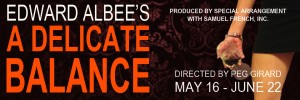By PAM HARBAUGH
Maintaining can be quite a balancing act. Emotions churned up by life can tilt us this way and that, tipping our sense of stability and threatening a slide into oblivion.
This is one of the many important themes in Edward Albee’s three-act masterpiece, “A Delicate Balance,” currently engrossing audiences at Melbourne Civic Theatre.
The setting of this Pulitzer Prize winning play is the comfortable living room in a suburban home. Agnes and Tobias are a married couple on the verge of their golden years, as comfortable with each other as warm slippers.
But offstage, something lurks – Agnes’ alcoholic sister, Claire, and the couple’s 36 year-old daughter, Julia, en-route back home after a failed fourth marriage. The ordered home becomes the launching pad for emotions, threats, confessions, grand philosophy, insights and a battle between reality and blessed ignorance.
Nellie Brannan crafts a fine portrayal of Agnes, a complex woman who explains that keeping in shape means maintaining, holding the status quo. “I shall keep it in shape,” she announces. Ms. Brannan takes Agnes from comfortable propriety to the edge of despair when she questions Clair’s lack of respect, Tobias’ fidelity and her own daughter’s exhausting need to be consoled. Calling herself the “fulcrum,” Agnes reveals her own difficulty in keeping the balance whens she says about her own family and friends — “the helpless are the cruelest lot of all – they shift their burdens so.”
Terrence Girard disappears into his portrayal of Tobias, slicing him open to reveal fear, guilt and deep love. He has a remarkable monologue (the play is loaded with them) about a stray cat he once loved. As he descends into this chilling monologue, a sense of foreboding rises, making one wonder what is going to happen in this play. “We live in a highly moral land,” he says. “We assume we have done great wrongs.”
Although keen universality rings throughout Mr. Albee’s Pulitzer Prize winning drama, it was written in 1966 which profoundly informs. This was a tipping point in American society — we were finally taking a breath from years of Cold War terror when social upheaval confronted us and diluted lifestyles like those enjoyed by Agnes and Tobias. Indeed, in the play’s third act, reference is made to the “help” not cleaning up and leaving the family to make its own coffee.
The dread of change is made manifest at the end of the first act when the couple’s lifelong friends, Edna and Harry, pay an unexpected visit. Edna (Tori Smith at her best) is on the verge of tears. Harry (Michael Thompson in tidy, restrained form) is obviously troubled. They soon confess that in the midst of a normal evening, she was doing needlepoint and he was practicing French, they both felt an unspeakable fear. Their terror was so fierce, they left their house to move in with Agnes and Tobias.
Thus enter the slap of theatrical absurdism for which Mr. Albee is known. Edna and Harry settle into Julia’s room, bags and all, displacing the self-pitying daughter (shades of Chekhov’s “Three Sisters”). Edna soon dictates how the room should be decorated and how Julia should behave.
Their presence ratchets up the emotions and dynamics. They are the chemical activator, setting the petri dish foaming with threat and confrontation.
As Agnes says, they are “the plague, the terror, sitting in the room upstairs.”
Like his celebrated 1962 drama “Who’s Afraid of Virginia Woolf?” another strong current in this play is escaping from reality, a subject about which Mr. Albee opined in 1996 in “The Progressive”: “I don’t think there’s any problem with having false illusions. The problem is with kidding yourself that they’re not false. O’Neill said, in that extraordinary play that nobody does, The Iceman Cometh, that we have to have pipe dreams. I think Virginia Woolf was in part a response to that; it’s better to live without false illusions, but if you must have them, know that they are false. It’s part of the responsibility of the playwright to help us see when they’re false.”
Clair, wonderfully brought to life by Susan Suomi (we want to see more of her on stage), is the wisecracking realist who copes by frequent trips to the liquor cabinet. Early in the play, Tobias asks Clair what he can do for her, she replies “Kill Agnes.” Their dialogue quickly spins into murdering the entire family, a delicious bit of foreboding. But she is our “fool,” whose insightful quips leaven the action.
Tracey Thompson flawlessly presents Julia as a distraught woman in constant need of reassurance. She is deeply flawed, though, without a whit of independence or responsibility. The only balm she offers is to make a pot of coffee.
Scenic designer Alfie Silva creates a balanced living room, anchored up center by the liquor cabinet, suggesting the real fulcrum in the action. However, the production would be better served by toning down the clash of color and styles in this intimate theater. While thematically revelatory, it visually upstages the fine cast.
This electrifying, complex three-act play, is directed with integrity by Peg Girard, who heeds Mr. Albee’s demanding stage directions for the actors.
It instantly grabs you and holds you tight. This production goes by in a flash, leaving you satisfied with its artistry, its performances and, not at all the least, Mr. Albee’s exquisite talent at using absurdity to paint important lessons.
(Glenn Close and John Lithgow will star in ‘A Delicate Balance,’ scheduled to open on Broadway for previews in October, 2014.)
SIDE O’ GRITS:
“A Delicate Balance” runs through June 22 at Melbourne Civic Theatre, 817 E. Strawbridge Ave., Melbourne. It performs 8 p.m. Fridays and Saturdays and 2 p.m. Sundays. Tickets are $25 general, $23 seniors, military and students. Call 321-723-6935 or visit www.mymct.org.











